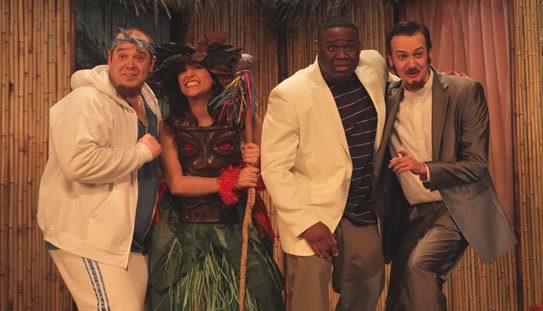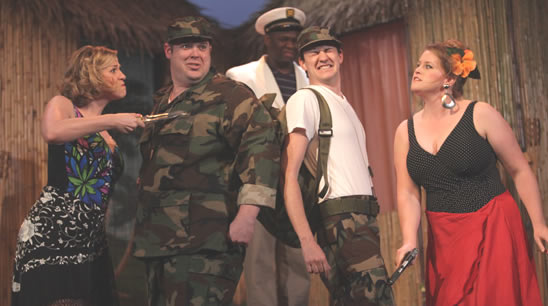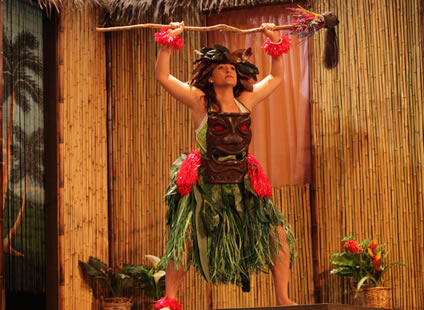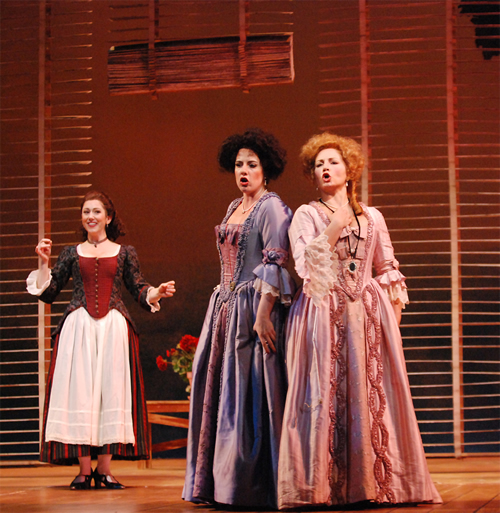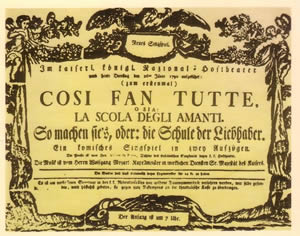Opera Performance Review
Houston Grand Opera Studio,
We Have A Problem:
Mozart's Cosė fan Tutte
by Connie Carr
April 2011
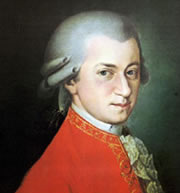 Wolfgang Amadeus Mozart |
|
Così fan Tutte |
Trying to figure out the idea of “Così fan Tutte” from the performance given by the Houston Grand Opera Studio, is like trying to figure out the principles of Italian cooking by eating a can of Chef Boyardee Spagettios.
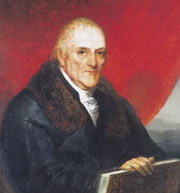 Lorenzo Da Ponte |
“Così fan Tutte”, or the “School for Lovers”, is one of the greatest operas in the repertoire, with some of the most sublime and beautiful music ever written. It starts out with characters who think love is a fantasy - officers who think their fiancees are goddesses, and two girls who don't have anything better to do in life but sit around and dream of their loves. Mozart and DaPonte have the greatest time ripping apart the fantasy love, and replacing it at the end with reason. And the audience should have the greatest time having participated in that.
Instead, we were insulted with “South Pacific Meets Cheech and Chong.” Mozart and DaPonte wrote both the music and lyrics to "Così fan Tutte." The post Congress of Cultural Freedom dogma that one opinion is as valid as another, and the practices of regietheater and updating are untrue to the opera and insulting to the audience. The time and place are all indicated by the libretto, and to change one or the other, while "keeping Mozart's music" is a dishonest presentation.
Left to right: Ferrando, Despina, Don Alfonso and Guglielmo. What sword? What sense of honor? |
Fiordiligi and Dorabella fall for Ferrando and Guglielmo disguised as Albanian soldiers. |
For example, Act 1, scene one, the original sin of this production, opens on a tropical beach, with Ferrando and Guglielmo dressed as beach bums and in a drunken stupor, with Alfonso smoking some kind of a pipe. But, nowhere does it say that Ferrando and Guglielmo are inebriated when, at the beginning of the opera, they, as gentlemen and officers, swear by their fiances' fidelity. Their honor is so offended that they challenge Don Alfonso "fuori la spada" - out with your sword. What sword? What sense of honor? The fact that these fine upstanding officers are so outraged at the suggestion of infidelity on the part of their goddesses is part of the humor of the opera, which is taken away in this production. Mozart and DaPonte's humor was overshadowed by the director's conceit and slapstick action. It's all in the music, too - the high- spirited confidence of the two officers is reflected in the three trios, especially the third, "Una bella serenata," at the beginning of the opera, when they swear by their fiancees' fidelity.
Updating to modern times of this production is untrue to the opera in many other ways. For example, the horrors of war - yes, they are always horrible, even today - but - these modern girls in this production have cell phones (that's how they admired their lovers in the first duet), and could text their soldiers at any time. The girls in 18th century Naples were a lot more horrified at the thought of never seeing their lovers again, as there was a good chance that they would die in battle, again, giving more comic absurdity to the whole idea of falling for the "Albanians.” Also, during their first duet with the cell phones, Fiordiligi and Dorabella were flirting with the two supernumeraries, caretakers of the grounds. So, it makes the point of the girls being outraged at being wooed by strange visitors all the more unlikely.
Despina the witch doctor. |
Another example is the references throughout the libretto to the Greek gods. It just doesn't fit in with the free wheeling, pot smoking, rapper culture, which is how this production is given, with the men disguised as rap stars instead of as Albanians. The two girls sing the deliciously playful “Prendero quel brunettino” while high on marijuana. In this production, Despina is disguised as a witchdoctor who used a car battery to cure the Albanians from their poison overdose. Mozart and DaPonte use this section to make fun of Mesmer[1] and magical healing powers of the magnet. Mesmer lived in Germany from 1734 - 1815. And the scientific and classical circles to which Mozart associated would be guided by reason and not magic.
Directors use the claim that they have to "update" in order to attract a wider, younger audience to opera. This is ludicrous. Although this performance was played to a relatively young crowd, this opera audience didn't really experience a Mozart masterpiece. They saw the equivalent of a bad Hollywood movie or on a TV sitcom, although accompanied by incredible music.
From the George Mason University's Virginia Opera's performance of Così fan Tutte in December, 2010, which respects the historical setting specified by the libretto. Soprano Camille Zamora as Despina, mezzo-soprano Katharine Tier as Dorabella and soprano Jan Cornelius as Fiordiligi. |
This approach is even more disdainful because the singing, by students from the HGO Young Artist Studio, was very promising. The first ensemble, the quintet "Di scrivermi agni giorno," didn't hold together well, perhaps from the singers having to deal with all the strange staging business, and they were also placed onstage very far from one another. The overall staging was a distraction both for the singers and the audience; the performers could not convey the true beauty, and comedy, inherent in Mozart, and what the audience saw was not the composition of the composer and poet.
Two arias that were beautifully sung were Brendan Tuohy's (tenor) “Un aura amorosa," and the Rachael Willis-Sorensen's (soprano) "Per, pieta," were also points in the opera where we got to hear the singer without any of the background distraction. The orchestral reduction and harpsichord continuo were played very well by pianists/coaches Elena Portnaya and Stephanie Rhodes, respectively.
The egregious and insulting staging destroyed any unity of effect in this 1790 musical masterpiece. Mozart's attack on sense perception and oligarchism was completely lost, and the idea of uplifting the population, using irony and humor was missing. Most importantly, the young HGO Studio opera singers and musicians deserve a chance to perform this incredible opera with the composer's idea in mind. Since they were able to bring out Mozart's music in some of their performance, they might change the world with a classical staging of Così fan Tutte, one of the most humane and ironic operas in the repertoire.
The sextet at the end is one of the greatest messages in all of opera:
Fortunato l'uom che prende ogni cosa pel buon verso
e tra i casi e le vicende da ragion guidar si fa.
Quel che suole altrui far piangere fia per lui cagion di riso
e del mondo in mezzo i turbani bella calma trovera.Fortunate is the man who sees the good in every thing,
and in all things and trials, lets himself be guided by reason.
That which only makes others weep, gives him cause to laugh,
and amidst the tumults of the world, he will find beautiful calm.
Marsha Bowen, Belinda Holtzclaw, Brian Lantz, and Evelyn Lantz also contributed to this review.
[1] For more on Franz Anton Mesmer and the Martinists, see http://www.larouchepub.com/eiw/public/2006/eirv33/eirv33n28.pdf
Related pages:

